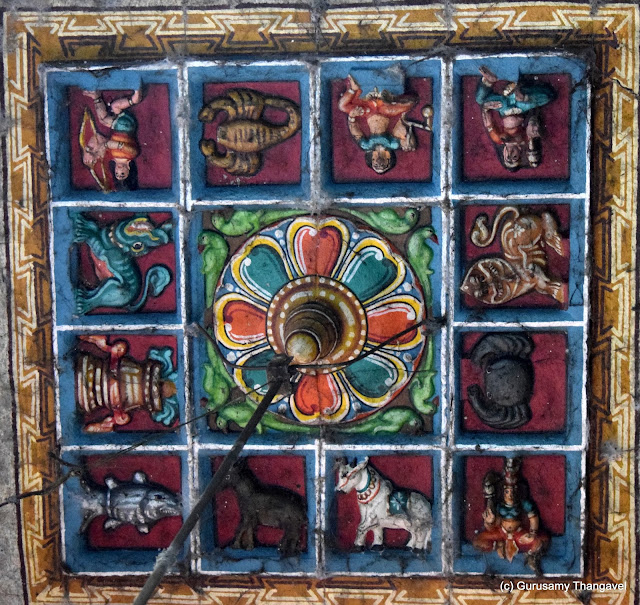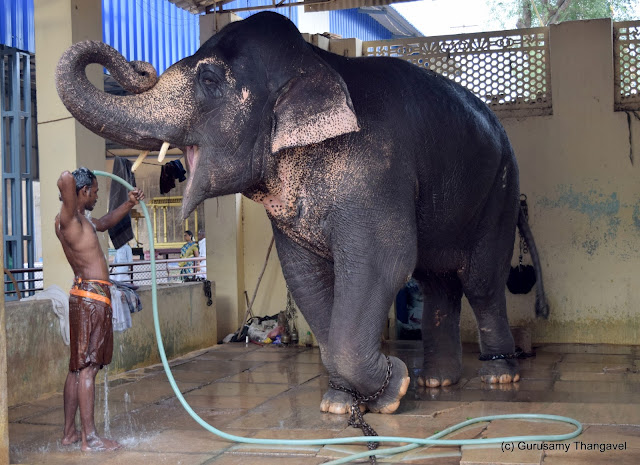Part 4: Second day (04/09/2016) Afternoon
We reached Keezhadi around 1.30 PM.
The excavation site is inside a large coconut grove. Keezhadi is a small
village on the northern banks of river Vaigai. A small road from Silaiman took
us to keezhadi. Silaiman is in the Sivaganga – Madurai road. Madurai city is
just 10 Kms away from Silaiman. There are lot trenches dug by archeological
survey of India (ASI). We could see lots of broken parts of terracotta pots
piled up near the trenches. I took some of them as souvenirs. We saw the group
of tents (camp) where the archeologists stay for the excavation work. One of
the research scholars Mr. Vasanthakumar explained us about the structures excavated
there. Carbon dating of the materials has not been done. Yet, he said, the site
is believed to be a Sangam age habitation (300 BCE to 400 CE) or beyond based
on other evidences, like the types of bricks and the Tamil Brahmi script which
was found at the site. In a causal mode, he complained about the poor funding
available for ASI work. He went on saying that they are not equipped with a
surveyor and a photographer to document everything; carbon dating is also
costly he said. The brick structures like small square rooms, the furnace like
structures, the terracotta ring wells and the open and closed water ways indicate
that there could be an ancient industrial habitat existed at Keezhadi. I wanted
to take photos of the materials which were unearthed there; but, Vasantha kumar
said that they were sent for the lab already. Their target was Madurai. Since it
has continuously been inhabited for more than 2500 years, excavation work is
not possible in Madurai. When we left Keezhadi around 3.30 PM, it was humid and
was about to rain.
My colleagues dropped me at Silaiman
and went back to Sivagangai. I took a town bus to reach Madurai from there. As
the bus entered Madurai, it started raining. I got down at Mahal bus stop as I
wanted to go to Thirumalai naicker mahal. The Thirumalai Naicker mahal is as
old as Taj mahal. In fact, it is slightly older than Taj. The great Naicker
king, Thirumalai, constructed it during early 17th century (1636
CE). Presently only one fourth of the structure is standing now. The intact
structure is originally the durbar hall of King Thirumalai Naicker. Upon
entering the mahal one would get astonished by looking at the massive pillars
and the big open courtyard. Some of the pillars are very large than what we
could imagine – 19 ft in circumference. In the present day real estate terms
one can construct a small house with the space occupied by a pillar. First time,
I felt my 18 mm wide angle lens is not enough to cover the entire mahal, such massive
is the palace. Sadly, it is not maintained well. I could see a lot of cob webs
and pigeon droppings everywhere. Moreover, our lay public also used the pillars
to express their petty love feelings.
Finally, I had walked down the road to
reach Meenatchi Amman temple and arrived at the Amman sannathi entrance. I have
a special place for Madurai in my heart. My first 13 years of life was spent in
Madurai and hence, lots of nostalgia attached with it. We often used to come to
Meenatchi Amman temple when we had lived in Madurai. I can vividly remember
sitting on the steps of the famous golden lotus tank, inside the temple, and
dreaming. Sitting on the steps of the temple tank and looking at the
magnificent temple towers was my favorite activity. In fact that place is the
photographer’s delight too; one can easily identify Meenatchi Amman temple by
these photographs. My mother used to come to this beautiful temple on every
Friday for Durga pooja. I and my sisters used to accompany her whenever we got
school holidays on Fridays. Even after we had relocated to Panagudi - my
mother’s native place - for few more years we used to visit Madurai by
travelling more than 200 kms, for Deepavali purchase.
Madurai is one of the very few
historical cities in the world, which is being continuously inhabited since
time immemorial. Moreover, Madurai was the epicenter of many happenings throughout
the history of Tamilakam till the 18th century. It lost its
importance to Chennai during the British era. However, with its one million
plus population, Madurai is still an important nerve centre of Tamil Nadu. The
city of Madurai may not appeal to a modern mindset. Some Tamil writers label
Madurai as a macho city. One may get into a wrong opinion about this historical
city by viewing some of the popular Tamil movies as they inadvertently wrongly portray
Madurai. One has to have a post modern or a cultural mindset to appreciate
Madurai. Varanasi is another city which can be compared with Madurai is this
aspect.
After taking photos of the beautiful drawings
on the Amman sannathi entrance doom, I had a dilemma of entering inside the
temple or not. My train to Chennai was at 7.45 PM. It was already 5.30 PM. Two
hours, at least, would need to cover inside of the temple; hence, I decided to
take photographs from outside. Moreover, I was terribly tired as I didn’t have
proper sleep for two nights and the continuous travels also added into. I could
sense that I am aging too :-)
First, I went
inside the Pudhu Mandapam (New pavilion), which is opposite to the majestic Eastern
tower to take photographs. Pudhu mandapam is also a contribution of King Thirumalai
nayak for the Goddess Meenatchi. It has lots of fabulous sculptures; but, the
temple administration has rented the space for small shops. During my childhood,
I used to buy text books and the guides from the shops located here. After
coming out of Pudhu mandapam, I leaned to the nearby lamp post and started zoom
into the Eastern tower with my 300mm lens. I could see, in close range, lots of
beautiful sculptures. The temple towers were in their natural colors thirty years
before and now they are in bright colors. Some people don’t like the bright
colors on the temple towers. They feel that the beauty of the tower and its
exquisite sculptures are best appreciated in their natural color than with
bright colors. I am not, however, able to judge on that now. To be frank, I seem
to like the colored temple towers more. I started walking towards the southern tower
and took more photographs of that tower too. One of the sculptures in the
southern tower, which attracted me is a god with (Vishnu?!) many heads arranged
in the shape of the tower. In fact one of my primary aims of buying a DSLR
camera with a 300 mm telephoto lens is to take photographs of these majestic towers
and their marvelous sculptures. I am happy that I started fulfilling my objectives.
I started experiencing severe headache. I deliberately needed a rest. So I started walking towards the railway station. I know this part of Madurai by heart. On the way to the station, I ate idlis in a medium size restaurant. I bought a crocin tablet too; eat halwa from the famous Prema vilas sweet shop, opposite to the railway station and bought some more for my house too. When I had entered the station it was around 7.30 PM. The train had come on time and I slept by around 8.00 PM and woke up around 4.30 AM only as the train was nearing Tambaram where I had to get down. I felt really happy about my trip, as I was able to go with my meticulous plans. I am not the kind of person who is known to stick to the plans. In this aspect, this trip, in recent times, was a successful one for me in terms of the planning and execution. History is always a fascinating subject for me. I am thinking of visiting each and every district of Tamil Nadu and document the history for my own understanding. I did not even know that a small district like Sivaganga has a rich history until I started planning for my trip. Still I could not cover few other historical places of importance in Sivaganga, like Piran malai - the place of ancient king Pari etc. In those two days I got a feeling that I had travelled through the cross section of the ancient, medieval and modern Sivaganga district. Experiencing the micro history of each region of Tamil Nadu and India is my desire. Travel is the only way one can achieve this. Each region in every part of the world has got its own history from ancient days. But unfortunately, our life time is not enough to cover all.
More photos Meenatchi Amman Temple can be seen here...

















































